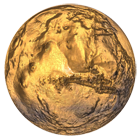A burning question posed from some of our readers recently has been 'who discovered Mars', the red planet. The ancient Egyptians labeled the planet, 'Har Deucher' (translated as 'The Red One') and the Babylonians in around 400 BC recalled the planet as 'Nergal' (translated as 'The Star of Death'). Following this period, the Greeks named it 'Ares' (which actually means in today's terms, 'wandering star'), and it was not until the Romans rein that the modern reference to the planet, 'Mars' was introduced (after the God of War).
Mars the Red planet is the 4th planet from the sun, only after earth and before Uranus. Mars is the Earth's outer neighbor and Mars has proven to be a good context for many films in recent years, with many representing Mars as a source of exotic and occasionally lethal life forms. Mars is also recognized as the red planet on account of the iron based dust giving the planet it's red colour. The Mars Pathfinder rover touched down on the planet on July 4th, 1997, bearing a mobile robot that examined the immediate locality.
More recently in 2001, Mars Odyssey which is an orbital craft bearing science experiments intended to make comprehensive observations of Mars to better our knowledge of the planet's atmosphere and geological past, obtained significant data to assist scientists in their objectives to learn more about this strange planet. Recently it has been disclosed that experts believe there is in fact water beneath the surface of Mars contained in underground reserves but given the surface temperatures of between -133 C to 27 C any water deposits which may find themselves escaping to the surface would not be identifiable for any length of time.
Mars turns on its axis once every 24 hours and 37 minutes, meaning its daytime is approximately the equivalent to Earth's. The atmosphere is very thin and composed principally of carbon dioxide, however dust storms can shroud the entire planet for months at a time. Also visible from recent photographs, the planet Mars also has huge canyons, sand banks, polar ice summits and additional characteristics akin to those located on Earth.
The Red Planet is not a quick trip away however, being some 228 million kilometres at a distance from the sun which is just as well, given it is believed that the severe surface conditions and intense solar radiation which saturates the surface is not capable of maintaining any form of human existence. In summary therefore in response to your 'who discovered mars' question, as far as we currently know, (in the absence of other 'we's' in the universe) 'we' discovered it....
Who Discovered Mars









